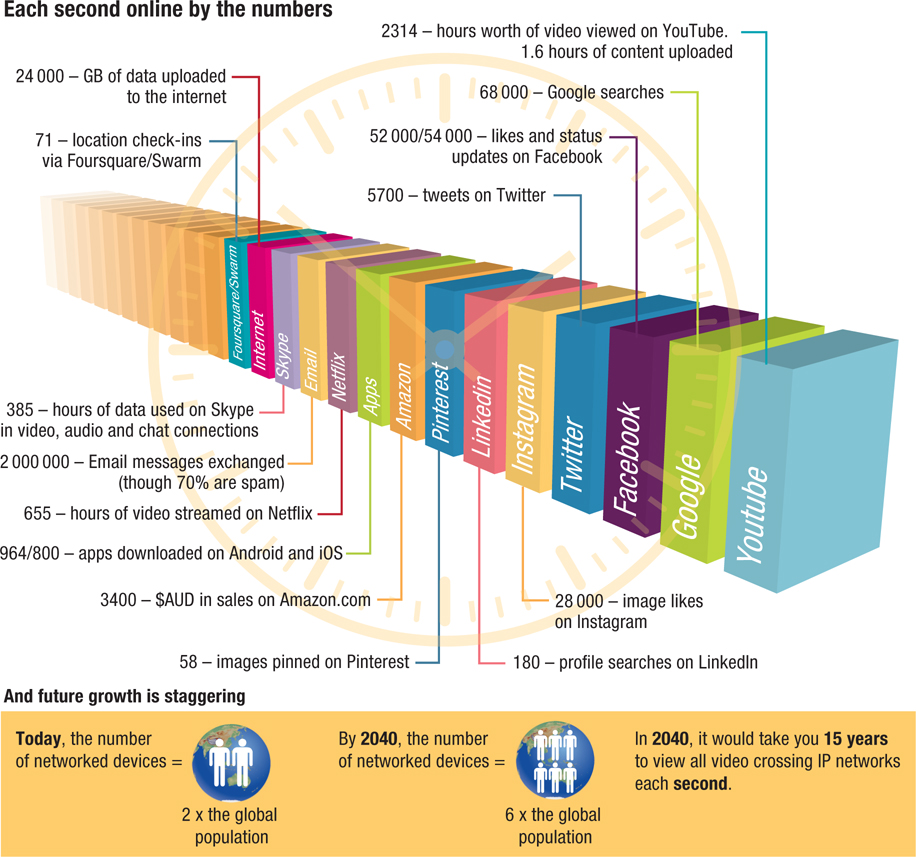2.2 Advantages and disadvantages of computer use
Digital technology is now tightly wound into the fabric of our society. Smartphones in particular have revolutionised how people interact with each other. Advancements in technology have affected the workplace and job opportunities.
Advantages
Advantages of computer use include:
- New ways to communicate personally – social media, smartphones.
- Text-based computer communication opens a world of opportunities to those with physical or social problems.
- Technology automates manufacturing to provide goods at a cheaper price.
- Technology assists in medical research and creativity.
- New industries develop based on evolving computerisation increasing job opportunities.
- Games and educational tools are more sophisticated and fun to use.
- New technology means computers are far more portable than before.
Disadvantages
Disadvantages of computer use include:
- Communicating via smartphone interferes with personal communication face to face.
- Gaming addiction can be a real problem interfering with other normal parts of life.
- Portability of computers enables them to encroach in areas where they wouldn’t normally be and so interfere with other parts of life.
- New technology in some industries reduces the workforce required, resulting in job losses.
- Money is invested in technology rather than people.
- Older people sometimes feel alienated in the workplace because of their lack of computer skills.

Social and ethical practice in IT exercise 2
ICT in the workplace 1
- In the last 10 years, which kinds of jobs have been replaced by computers?
- For three of those jobs, explain why they were overtaken by a computer. What are the advantages in using a computer for this particular job?
- In the last 10 years, which kinds of jobs have been changed by computers?
- For three of those jobs, explain how the job has changed and what the advantages are.
- In the next 10 years, which kinds of jobs do you think could be replaced or changed by computers?
While many jobs have been lost through the development of technology, there have also been many new types of jobs created such as:
- computer technicians
- computer graphic designers
- computer programmers
- content writers for internet sites
- computer trainers
- help desk
- call centre operators
- data entry operators
- computer cleaners.
Jobs in other industries have also expanded or changed due to increased leisure time because of advancements in technology; for example, tourism.
Social and ethical practice in IT exercise 3
ICT in the workplace 2
- What kinds of jobs have been created by the use of computers and the development of the internet?
- From your list above, pick two occupations and find out what they do and what qualifications are required for the position.
- In the next 10 years, what new kind of jobs do you think will be created by computers?
- What could you do if you wanted to ensure employment in a computerised workforce?
- What steps can an older person take to ensure they stay in the workforce?
Social and ethical practice in IT exercise 4
ICT in the workplace 3
Consider this scenario: You may already have noticed a facility in some supermarkets allowing self-serve checkouts where the shopper scans their purchases then pays with a credit card or even cash, which means there’s no need for a checkout operator. Each item’s barcode is also fitted with a security device, which is deactivated on scanning to prevent theft. The cost of a swiping station is much less than the combined cost of a cash register and checkout operator. Because they cost less, the store can have more stations, which results in keeping queues to a minimum. Customers move through the self-serve stations more quickly because they have control over the speed of the process.
- Who are the users of the traditional system at a supermarket checkout?
- Which group is helped by this new technology? What problems could still be associated with this new system?
- Which group is adversely affected?
- Who would benefit the most from this new system?
- What new employment opportunities could arise from this technological development?
- Can you think of other organisations where this type of system could be used?
